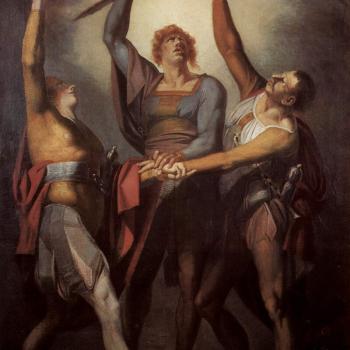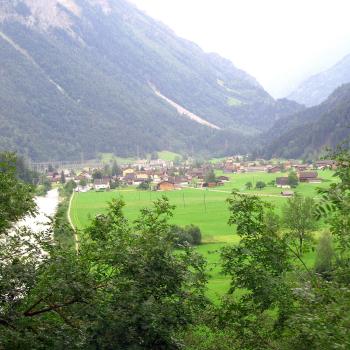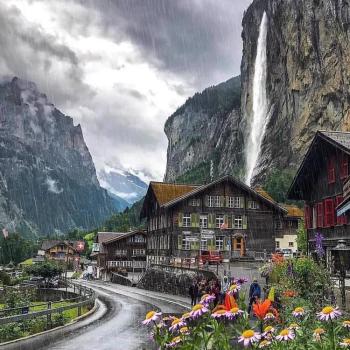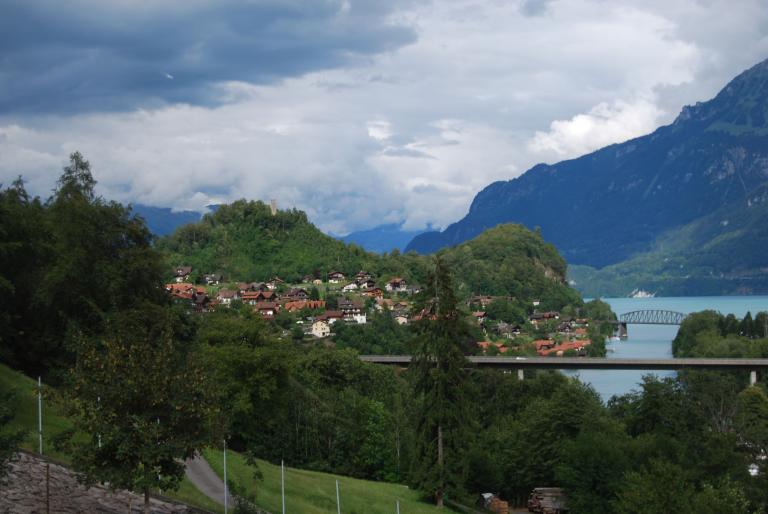
What the heck. I’m in the mood, and I think that I haven’t told this missionary story here before. So I offer to you yet another exercise in geezerly nostalgia. (It’s my blog, after all. Just try to stop me!)
One of the principal areas where my companions and I “tracted” — for the uninitiated, in the Latter-day Saint subdialect of English tracting means going from door to door seeking people who might be interested in hearing the message of the Restoration — during the seven months that I was assigned in the Interlaken area was a town called Ringgenberg. It sits on the northwestern shore of the Brienzersee, one of the two large lakes that border aptly-named Interlaken.
We were quickly struck, as we met the people of the town, by the great loyalty that they said they felt toward their pastor. In most cases, of course, they were really just saying that they weren’t interested in talking with us. But I had never previously encountered the excuse that they loved their pastor too much to listen to what we had to tell them. Clearly, there was something unusual about this man, and I decided that I would like to meet him.
Accordingly, my companion and I went one day and rang the doorbell of the parsonage. It was a large white house, located not very far from the seventeenth-century Ringgenberg parish church, which was built on the ruins of an earlier castle. If I’m not mistaken, it was his wife who first opened the door. She then went and fetched her husband, who had been working in his study.
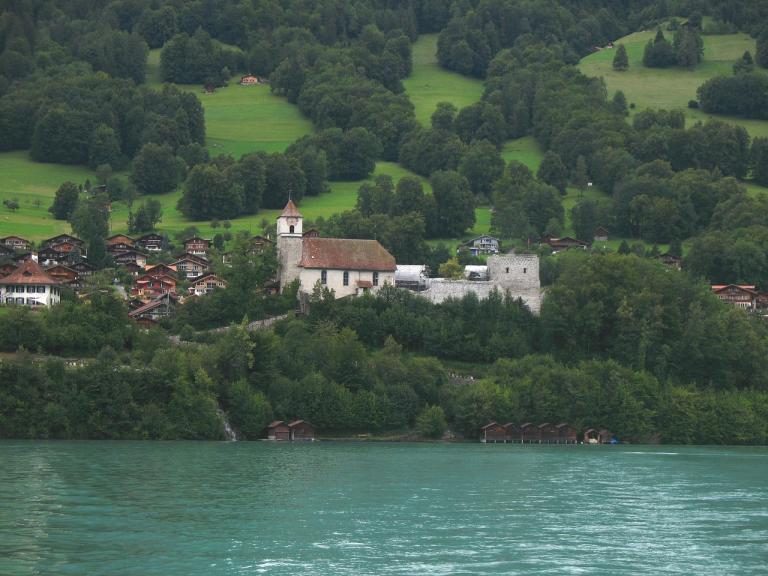
When he came to the door, he was plainly not happy to meet us, and he pretty much told us so. We went back and forth for a minute or two, civilly but not particularly warmly. He wanted to know where we were originally from, and something about what we were doing. We were still standing at the door. Suddenly, he said “Just a minute.” (Auf Deutsch, natürlich.) After about a minute or so, he returned with a copy of the Bible. He opened it to John 3:16, read it to us, and demanded to know whether we accepted what that verse said.
We responded that Yes, we absolutely accepted it. That idea, in fact, was at the very heart of what we were doing. At that, his attitude visibly softened, and he invited us to come into the parsonage. We sat down, and had a very pleasant visit.
We soon understood the exceptional fondness of the people in Ringgenberg for this pastor. It may or may not be fair, but my general impression of the Protestant clergy that I met in Switzerland, both before and after Ringgenberg, was that they were bright men who had settled into a fairly undemanding but reasonably high-paying and tax-supported job, giving a weekly sermon and occasionally meeting with a church ladies’ group, having the leisure to read and think and perhaps even to write a little bit, living at cantonal expense in the largest house in their village or neighborhood. I didn’t have a particularly positive impression of them — and, again, I freely admit that my opinion may have been unjust — whereas I had often been very positively impressed by the Catholic priests that I had encountered. (They had actually made some real sacrifices — e.g., marriage and family — in order to be ordained, and I thought that I could sense the difference in their sincere devotion and dedication.)
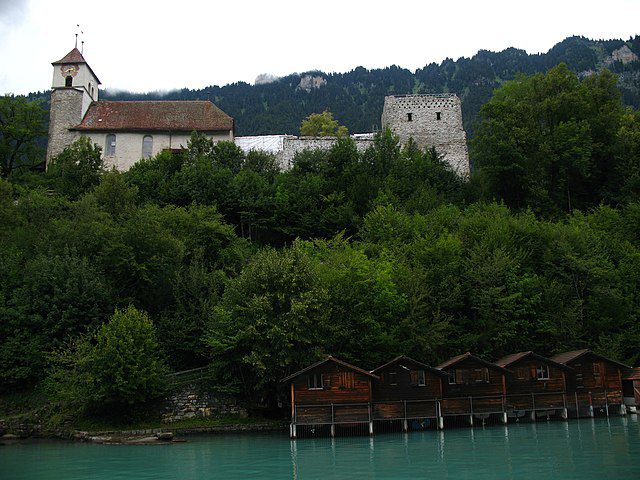
(Wikimedia Commons public domain photo by Andrew Bossi, dated 2007)
The story of this Ringgenberg pastor, though, was quite different. He had been a successful lawyer, but had found the life of an attorney personally unsatisfying. He didn’t feel that he was serving people, or making a difference. So he quit the law, taking thereby a significant financial hit. He enrolled in divinity school, and became a Pfarrer or pastor. Ringgenberg was his first pastorate, and he was fairly old to be just starting out.* (I don’t know how old he really was. In his early forties, perhaps. Please recall that I had just turned twenty.)
But he was frustrated, he told us. He really wanted to be of service to his parish, but he was only one man. He couldn’t be everywhere, and, quite often, when he heard that somebody was sick or in need or even dying, it was too late for him to be of any assistance. We told him at that point about what was then called home teaching. This was a means by which our bishops, we said, could be alerted to serious problems in a congregation. And home teachers were often actually the front line of service, not merely an early warning system for the congregation’s leader. Although we explained that the system didn’t always work as it should, he was intrigued and fascinated by what we had to say. We talked about other things, but that’s what I mostly remember.
We ended on a pleasant note, and I thought that that would be the end of it. Shortly thereafter, though, a couple that we had been trying to teach invited us to dinner at their home. And the other guests were . . . the pastor and his wife. I’m not sure what the point of that was. I honestly don’t think that our hosts were hoping for fireworks. In any case, there were none. We had a very enjoyable evening and, as we were going out, the pastor and his wife invited us to dine with them sometime thereafter at the parsonage.
We accepted, of course. And, on the evening of the dinner, we picked up some flowers to bring. Which really sealed the deal. Some weeks thereafter, when a visiting German choir sang in the Ringgenberg church, my companion and I were the pastor’s invited guests, in his box with his family. I’ve wondered to this day what his parishioners made of that.
Not too long thereafter, alas, the Interlaken area was shut down for the summer, as it always was. (It’s a hugely popular tourist town, and there is little point in having missionaries there when everybody is working long hours and taking extra jobs in the tourist shops and when the streets are aswarm with foreign visitors.) I’m ashamed to say that I lost touch with the pastor of Ringgenberg.
Several times in recent internet-blessed years, I’ve made passing efforts to find him, or something about him, online. (His name was Theo Bürk.) I’ve found a little bit, but nothing useful. So many years have elapsed now, though, that I wouldn’t be surprised if he’s passed away. And, anyway, I probably made a far weaker impression on him than he made on me. He was a good man, and I’m confident that he has been and will be blessed for his desire to serve others. “And behold, I tell you these things that ye may learn wisdom; that ye may learn that when ye are in the service of your fellow beings ye are only in the service of your God” (Mosiah 2:17).
* Amusingly, during my earlier assignment, in Burgdorf, northeast of Bern, several people let my companion and me into their homes because, they explained, they had thought that I was their new pastor. Apparently, he was just barely out of his theological training and in his first parish, and, they said, we looked very similar to each other. I didn’t think much of it until, one day, I saw me coming toward me up a path in a small wood. We really did look like each other. He was probably a few years older than I was. Maybe twenty-five or twenty-six or so, but he was very young-looking, and my hairline was already precociously receding. Anyway, he was much, much younger than the pastor in Ringgenberg.
Posted from Amsterdam, The Netherlands



